#i think neil is the only one who has some sort of idea but even still the detail andrew has to go into?
Explore tagged Tumblr posts
Note
do you think andrew and aaron talked about his testimony before the trial, like about what andrew was going to say, or did aaron find out the full extent of what happened at the same time the jury did?
hmm. good question. i don’t know! easy answer: no, not at all. i think aaron is completely clueless going into it and every word that comes out of andrew’s mouth on that stand hit him like a fucking truck. i think he holds his head in his hands because he can’t listen to it, it hurts too much, he can’t see andrew like this. andrew doesn’t want him to see him like this. so clinical. so straight forward and honest about his abuse. describing what drake did to him, for so long, and nobody knew about it? nobody had any idea what andrew was going through? yeah i think it really upsets aaron when andrew takes the stand, because he had no preparation whatsoever for what he was going to say. he’s expecting andrew to talk about that night, and then andrew is talking about being 13 or 14 and it’s just. it’s awful.
the other answers:
1. it comes up in their therapy sessions. a week or two before the trial andrew mentions that he’s probably going to get called as a witness and privately he’s already spoken to bee, but in their joint sessions aaron brings it up first. he mentions something about how he’s worried about andrew having to speak about that night on the stand, and how he doesnt know how he’ll be able to sit in that room and hear about what drake did to him for the first time there, in front of the judge, a jury. andrew tells him not to worry, to just cover his ears and not listen. but it ends up in possibly a very loose conversation, andrew telling him what he’s likely going to have to talk about, purely so aaron isn’t sideswiped on the stand.
2. maybe they talked privately about it. they’re both restless and freaking out for the week before the trial and maybe they just catch each other at the wrong/right time and they ask each other what’s going on. aaron tells him everything, blurting the things out that he can’t talk to anyone about, his fears his worries, how he can’t sleep the closer it gets. but one thing he mentions is andrew. and andrew tries to get him to be quiet about it, but aaron keeps going, and he talks about how he doesn’t know what he’s going to do, with andrew up on the stand talking about his abuse, the things he had no idea about. andrew asks him why he’s worried. and aaron looks at him but he can’t look him in the eyes and he’s just like. i don’t know how i’m going to look at you knowing the truth about what you’ve been through. and i can’t hear that for the first time in front of all those people. so maybe andrew alleviates his stress by opening up, by telling him the roundabout truth about what he’s going to have to talk about.
3. aaron’s lawyers tell him. whether andrew would be in the room or not, idk, but they’re talking through their points and they brief aaron on what andrew is likely to be asked. maybe they show aaron andrew’s statements. maybe aaron has to read in andrew own words who drake was to him, and then he has to go out and sit in that courtroom and watch his brother take the stand feeling different about him. knowing too much, but at least knowing what to expect when the prosecutor starts asking questions.
#number 3 maybe i could see being aaron’s pre warning#but personally i don’t think he knows#i think neil is the only one who has some sort of idea but even still the detail andrew has to go into?#the ONLY person who somewhat has heard that level of detail about his abuse is betsy#and it’s just so much more devastating that way#aaron with his hand over his mouth listening to his brother describe this life he never knew about#he listens to him talk about cass and drake and he looks over his shoulder to see cass crying#with her husbands arm around her#and all aaron feels is disgust and hate and anger and sadness#because even from there he can see how uncomfortable andrew is#and it feels like his fault#andrew would’ve never talked about it if aaron hadn’t killed drake#andrew would never have to stand up there in front of cass and describe the scars drake left him with#if aaron hadn’t done what he did#he feels a lot of emotions when andrew is on the stand#because at the end of the day they love each other SO MUCH#it hurts#ask
50 notes
·
View notes
Text
'...“It’s fun playing bad, but actually he’s not,” the actor says, smiling as he reflects on his character, Crowley. “He’s a villain with a heart. The amount of really evil things he does are vanishingly small.”
...As it always has, “Good Omens” dissects the view of good and evil as absolutes, showing viewers that they are not as separate as we were led to believe growing up. Aziraphale and Crowley’s long-standing union is proof of this. The show also urges people to look at what defines our own humanity. For Tennant — who opted to wear a T-shirt emblazoned with the words “Leave trans kids alone you absolute freaks” during a photocall for Season 2 — these themes are more important now than ever before.
“In this society that we’re currently living in, where polarization seems ever more present, fierce and difficult to navigate. Negotiation feels like a dirty word at times,” he says, earnestly. “This is a show about negotiation. Two extremes finding common ground and making their world a better place through it. Making life easier, kinder and better. If that’s the sort of super objective of the show, then I can’t think of anything more timely, relevant or apt for the rather fractious times we’re living in.”
“Good Omens” is back by popular demand for another season. How does it feel?
It’s lovely. Whenever you send something out into the world, you never quite know how it will land. Especially with this, because it was this beloved book that existed, and that creates an extra tension that you might break some dreams. But it really exploded. I guess we were helped by the fact that we had Neil Gaiman with us, so you couldn’t really quibble too much with the decisions that were being made. The reception was, and continues to be, overwhelming.
Now that you’re no longer bound by the original material that people did, perhaps, feel a sense of ownership over, does the new content for Season 2 come with a sense of freedom for you? This is uncharted territory, of sorts.
That’s an interesting point. I didn’t know the book when I got the script. It was only after that I discovered the worlds of passion that this book had incited. Because I came to it that way, perhaps it was easier. I found liberation from that, to an extent. For me, it was always a character that existed in a script. At first, I didn’t have that extra baggage of expectation, but I acquired it in the run-up to Season 1 being released… the sense that suddenly we were carrying a ming vase across a minefield.
In Season 2, we still have Neil and we also have some of the ideas that he and Terry had discussed. During the filming of the first one, Neil would drop little hints about the notions they had for a prospective sequel, the title of which would have been “668: The Neighbour of the Beast,” which is a pretty solid gag to base a book around. Indeed there were elements like Gabriel and the Angels, who don’t feature in the book, that were going to feature in a sequel. They were brought forward into Season 1. So, even in the new episodes, we’re not entirely leaving behind the Terry Pratchett-ness of it all.
It’s great to see yourself and Michael Sheen reunited on screen as these characters. Fans will have also watched you pair up for Season 3 of “Staged.” You’re quite the dynamic duo. What do you think is the magic ingredient that makes the two of you such a good match?
It’s a slightly alchemical thing. We knew each other in passing before, but not well. We were in a film together [“Bright Young Things,” 1993] but we’d never shared a scene. It was a bit of a roll of the dice when we turned up at the read-through for “Good Omens.” I think a lot comes from the writing, as we were both given some pretty juicy material to work with. Those characters are beloved for a reason because there’s something magical about them and the way they complete each other. Also, I think we’re quite similar actors in the way we like to work and how we bounce off each other.
Does the shorthand and trust the two of you have built up now enable you to take more risks on-screen?
Yes, probably. I suppose the more you know someone, the more you trust someone. You don’t have to worry about how an idea might be received and you can help each other out with a more honest opinion than might be the case if you were, you know, dancing around each other’s nervous egos. Enjoying being in someone’s orbit and company is a positive experience. It makes going to work feel pleasant, productive, and creative. The more creative you can be, the better the work is. I don’t think it’s necessarily a given that an off-screen relationship will feed into an on-screen one in a positive or negative way. You can play some very intimate moments with someone you barely know. Acting is a peculiar little contract, in that respect. But it’s disproportionately pleasurable going to work when it’s with a mate.
Fans have long discussed the nature of Crowley and Aziraphale’s relationship. In Season 2, we see several of the characters debate whether the two are an item, prompting them to look at their union and decipher what it is. How would you describe their relationship?
They are utterly co-dependent. There’s no one else having the experience that they are having and they’ve only got each other to empathize with. It’s a very specific set of circumstances they’ve been dealt. In this season, we see them way back at the creation of everything. They’ve known each other a long time and they’ve had to rely on each other more and more. They can’t really exist one without the other and are bound together through eternity. Crowley and Aziraphale definitely come at the relationship with different perspectives, in terms of what they’re willing to admit to the relationship being. I don’t think we can entirely interpret it in human terms, I think that’s fair to say.
Yet fans are trying to do just that. Do you view it as beyond romantic or any other labels, in the sense that it’s an eternal force?
It’s lovely [that fans discuss it] but you think, be careful what you wish for. If you’re willing for a relationship to go in a certain way or for characters to end up in some sort of utopian future, then the story is over. Remember what happened to “Moonlighting,” that’s all I’m saying! [Laughs]
Your father-in-law, Peter Davison, and your son, Ty Tennant, play biblical father-and-son duo Job and Ennon in Episode 2. In a Tumblr Q&A, Neil Gaiman said that he didn’t know who Ty’s family was when he cast him. When did you become aware that Ty had auditioned?
I don’t know how that happened. I do a bunch of self-tapes with Ty, but I don’t think I did this one with him because I was out of town filming “Good Omens.” He certainly wasn’t cast before we started shooting. There were two moments during filming where Neil bowled up to me and said, “Guess, who we’ve cast?” Ty definitely auditioned and, as I understand it, they would tell me, he was the best. I certainly imagine he could only possibly have been the best person for the job. He is really good in it, so I don’t doubt that’s true. And then my father-in-law showed up, as well, which was another delicious treat. In the same episode and the same family! It was pretty weird. I have worked with both of them on other projects, but never altogether.
There’s a “Doctor Who” cameo, of sorts, in Episode 5, when Aziraphale uses a rare annual about the series as a bartering tool. In reality, you’ll be reprising your Time Lord role on screen later this year in three special episodes to mark the 60th anniversary. Did you always feel you’d return to “Doctor Who” at some point?
There’s a precedent for people who have been in the series to return for a multi-doctor show, which is lovely. I did it myself for the 50th anniversary in 2013, and I had a wonderful time with Matt [Smith]. Then, to have John Hurt with us, as well, was a little treat. But I certainly would never have imagined that I’d be back in “Doctor Who” full-time, as it were, and sort of back doing the same job I did all those years ago. It was like being given this delightful, surprise present. Russell T Davies was back as showrunner, Catherine Tate [former on-screen companion] was back, and it was sort of like the last decade and a half hadn’t happened.
Going forward, Ncuti Gatwa will be taking over as the new Doctor. Have you given him any advice while passing the baton?
Oh God, what a force of nature. I’ve caught a little bit of him at work and it’s pretty exciting. I mean, what advice would you give someone? You can see Ncuti has so much talent and energy. He’s so inspired and charismatic. The thing about something like this is: it’s the peripherals, it’s not the job. It’s the other stuff that comes with it, that I didn’t see coming. It’s a show that has so much focus and enthusiasm on it. It’s not like Ncuti hasn’t been in a massive Netflix series [“Sex Education,”] but “Doctor Who” is on a slightly different level. It’s cross-generational, international, and has so much history, that it feels like it belongs to everyone.
To be at the center of the show is wonderful and humbling, but also a bit overwhelming and terrifying. It doesn’t come without some difficulties, such as the immediate loss of anonymity. It takes a bit of getting used to if that’s not been your life up to that point. I was very lucky that when I joined, Billie Piper [who portrayed on-screen companion, Rose] was still there. She’d lived in a glare of publicity since she was 14, so she was a great guide for how to live life under that kind of scrutiny. I owe a degree of sanity to Billie.
Your characters are revered by a few different fandoms. Sci-fi fandoms are especially passionate and loyal. What is it like being on the end of that? I imagine it’s a lot to hold.
Yes, certainly. Having been a fan of “Doctor Who” since I was a tiny kid, you’re aware of how much it means because you’re aware of how much it meant to you. My now father-in-law [who portrayed Doctor Who in the 80s] is someone I used to draw in comic strips when I was a kid. That’s quite peculiar! It’s a difficult balance because on one end, you have to protect your own space, and there aren’t really any lessons in that. That does take a bit of trial and error, to an extent, and it’s something that you’re sometimes having to do quite publicly. But, it is an honor and a privilege, without a doubt. As you’ve said, it means so much to people and you want to be worthy of that. You have to acknowledge that and be careful with it. Some days that’s tough, if you’re not in the mood.
I know you’re returning to the stage later this year to portray Macbeth. You’ve previously voiced the role for BBC Sounds, but how are you feeling about taking on the character in the theater?
I’m really excited about it. It’s been a while since I’ve done Shakespeare. It’s very thrilling but equally — and this analogy probably doesn’t stretch — it’s like when someone prepares for an Olympic event. It does feel like a bit of a mountain and, yeah, you’re daring to set yourself up against some fairly worthy competition from down the years. That’s both the challenge and the horror of doing these types of things. We’ve got a great director, Max Webster, who recently did “Life of Pi.” He’s full of big ideas. It’s going to be exciting, thrilling, and a little bit scary. I’m just going to take a deep breath.
Before we part ways, let’s discuss the future of “Good Omens.” Gaiman has said that he already has ideas for Season 3, should it happen. If you were to do another season, is there anyone in particular you’d love to work with next time around or anything specific you’d like to see happen for Crowley?
Oh, Neil Gaiman knows exactly where he wants to take it. If you’re working with people like Gaiman, I wouldn’t try to tamper with that creative void. Were he to ask my opinion, that would be a different thing, but I can’t imagine he would. He’s known these characters longer than me and what’s interesting is what he does with them. That’s the bit that I’m desperate to know. I do know where Crowley might end up next, but it would be very wrong if I told you.
[At this point, Tennant picks up a pencil and starts writing on a hotel pad of paper.]
I thought you were going to write it down for me then. Perhaps like a clandestine meeting on a bench in St James’ Park, but instead you’d write the information down and slide it across the table…
I should have done! I was drawing a line, which obviously, psychologically, I was thinking, “Say no more. You’re too tempted to reveal a secret!” It was my subconscious going “Shut the fuck up!”
#David Tennant#Michael Sheen#Good Omens#Neil Gaiman#Terry Pratchett#Ty Tennant#Peter Davison#Aziraphale#Crowley#Doctor Who#Macbeth#Ncuti Gatwa#Job#Ennon#Bright Young Things#Series 2#Matt Smith#John Hurt#Russell T. Davies#Catherine Tate#Max Webster#Life of Pi#Sex Education#Billie Piper#Rose Tyler#BBC Sounds
3K notes
·
View notes
Text
"I think Aziraphale needs to learn a lot more than that..."
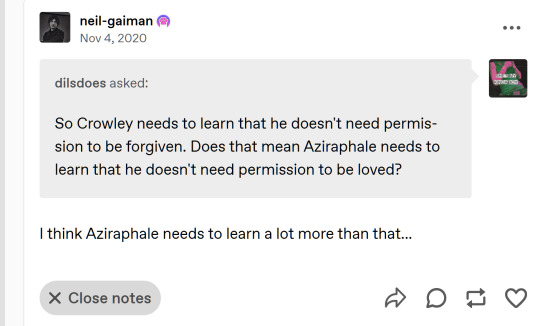
Why do people keep (telling me again and again about this quote) assuming that Neil means Aziraphale needs some moral lessons, get off his high horse, learn some hard truths about Heaven, escape their grasp, finally understand that they are bad etc etc etc.
When the ask is about how Crowley is always forgiven from Aziraphale's point of view and how what (I see) Neil means is that Azi should also be told he's good enough. That he can be loved.
That what he needs to learn is how to believe in himself. To trust his mind, his feelings, to believe he is enough, he always was, that he doesn't have to be perfect or 100% right, that it is not possible and that it's okay. That he's okay. That he was lied to.
I wish we would frame Aziraphale's journey/learning as something else, not morality/awakening of some sort. Not as something he has to overcome. When Crowley changes his mind on something, no one says, oh have a gold star, you went against what Hell wants from you. Well done! Why do we do that to Aziraphale. Crowley is seen in Hell, giving presentations on some half hearted ideas that no one there really gets and getting accolades for things he didn't do at all and everyone is like, oh yay, look at him, so clever. Hahahah. Aziraphale also has to follow rules and do his tasks whether he agrees with them or not or he will be punished. He's not doing it for fun. He breaks rules when he feels he simply must and then everyone is like oh look, he is finally abandoning the rigid thinking that Heaven showed/taught him. But really, the naïve slow angel, he should try even harder.
Why such double standards?
Aziraphale is good and wants to do good. He is not sure of himself, true, but that's hardly his fault. Crowley is also good and tries to do good or at least limit the bad things he needs to do to survive.
They are two sides of the same coin. They both learn and grow. Sometimes the treatment the Ineffables get reminds me of how differently boys and girls are treated when they are learning behaviour. Boys praised for anything and everything even remotely good they do (cos they are expected to be naughty) and girls get the oh you should have already known better treatment. Aziraphale saved Job's kids cos he thought it was a horrible thing to want to do and expected to be punished for it. That's not - he didn't, it didn't change who he is. He did it expecting Falling. That's extremely brave. Yes Crowley has Fallen and people tend to see this as some extra superior move on his behalf, like he had everything figured out, understood how bad Heaven was and tried to bravely fix it. And Aziraphale needs to catch up with him. (If not by Falling himself than by doing some extraordinary learning journey to catch up with Crowley's knowledge). No. That's all HC. We don't even know why Crowley Fell. We don't. We know what he says happened (and we also know that he's not a reliable narrator...) and that's all we know. And even the things he says are not exactly showing him as some truth waving hero only wanting to make Heaven better for everyone and failing. Aziraphale is not breaking rules cos suddenly he used his brain and saw how Heaven is bad. He already knows that. He's risking punishment to help others. Again and again. And that's very kind and admirable and everything but it's not his evolving morality. He's already moral. He's already good. He always was.
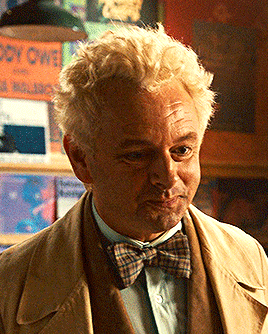
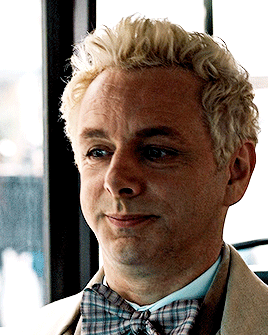
He's also fucking cute. Let's not forget.
#good omens#aziraphale#crowley#ineffable husbands#aziracrow#good omens 2#aziraphale my beloved#good omens thoughts#Aziraphale defence squad#kaypost
430 notes
·
View notes
Text
David Tennant at This Morning show with Alison Hammond and Dermot O’Leary talking about Good Omens Season 2, 11.07.2023 :) ❤
DO: And David joins us now. I mean, this looks like a great show.
David: Oh, yeah.
DO: So, I mean, It's pure Terry Pratchett and Neil Gaiman, isn't it?
David: It is, yeah.
DO: The whole thing. So tell us, so if people haven't seen the first series and they want to go back, set the whole scene.
David: So I'm Hell's representative on Earth, Michael Sheen is Heaven's representative on Earth, put there to do the biding of our respective Head Offices. But we found out that if we became mates and sort of helped each other out, it kind of cut out the workload, cancelled each other out. So we're best mates. But in Series One we end up having to avert the apocalypse, which we managed to do, but as a result of that, we get cut off. So we're now living on Earth as independent individuals.
AH: So do you still need each other, then?
David: We still need each other. We've only got each other now because we don't have Heaven and Hell anymore.
DO: Because you both love earth so much, you both like.
David: Oh, we much prefer living on Earth because Heaven's a bit stuffy and Hell's awful.
DO: So you conspire to thwart the Armageddon. Exactly.
David: We thwart the Armageddon. That's fine. But Series Two begins when the angel Gabriel, Jon Hamm, who you just saw there, shows up at Aziraphale, Michael Sheen's bookshop, naked with no memory, holding a cardboard box. So suddenly we're locked into the politics of Heaven and Hell again. We don't know what's going on. We've got a mystery to solve. Why is the angel Gabriel here? The angel Gabriel tried to kill us both at the end of the last series, so we've got to...
DO: But now he's kind of got amnesia and...
David: Yes. So he becomes like our weird child, in this sort of weird sort of eternal marriage that Michael and I are locked in.
DO: So many shows now use a book as their base and then they do really well and you can see the company and the writers go, better come up some new ideas, I suppose. So the book's obviously Terry Pratchett and then Neil Gaiman, correct?
David: That's right. They wrote that together years and years and years ago. Much beloved. And that's what the first series was. But Neil and Terry had always talked about possibilities of this sequel that they never got around to making. Terry's no longer with us. But when the possibility came up, Neil thought, well, listen, I've got some ideas. Let's spin it forward. Let's see if we can tell the story we were always going to tell. So we get to come back.
AH: Should we have a little sneak look at the new series? Let's have a look. So good. Did you ever think it was going to be this successful? Did you even know that you were going to go into a second series
David: Oh, no, not at all. No. There was only one novel, so we just thought we were coming together to do that. And I didn't realise how beloved this book was. I first read a script. But it means a lot to a lot of people.
AH: And the look of you is so striking. Did you have any input into that? A bit, yeah, we sort of all found it together, myself and makeup and costume and Neil Gaiman, who ran the show. So, yeah, we kind of arrived... in the book he's a bit more - because obviously the book was sort of early ninetues, so he was a bit more sharp-suited and a bit more Wolf of Wall Street. So we've kind of had to find the kind of modern equivalent of that.
DO: Is he... obviously you're playing a demon. Has he got any humanity in him or is he purely self-centered?
David: Well, he's not a very good demon. He's good at sort of the snarl and the swagger and pretending that he's terribly cynical, but actually his problem is that he's a bit too... there’s a bit too much heart, really.
DO: He's alright
David: Yeah, yeah.
DO: Must be wonderful playing a baddie.
David: Oh, it's great fun, but he's not a baddie, is not really a baddie.
DO: Yeah, yeah.
David: And just like Aziraphale angel is not always as goody goody as he likes it, so they meet very beautifully in the middle.
DO: You and Michael Sheen. I mean, you've worked together a fair bit, don't you. I loved Staged. That was such fun.
David: Yeah!
AH: Have you ever not worked together?
David: Now we only work together.
AH: All the time.
David: Yeah. I mean, He's not sitting on this sofa, but he is backstage. We can't be apart.
DO: He's speaking in his ear right now.
David: Exactly, yeah.
AH: But you are... you have got a genuine friendship. You're growing old together gracefully.
David: We're growing old together?!
AH: You look good for it, I'm not going to lie. What's the secret, babe?
David: A lot of makeup. It's very thick.
AH: We've got to talk about the fact that you are returning to Doctor Who.
David: Ah, yes.
AH: I can't believe this. And can you tell us anything at all?
David: I mean, beyond that I'm doing it? I think...
AH: No.
David: Really. Because that's the fun of it, isn't it? Hopefully tt was a bit of a surprise when I showed up. When Jodie Whittaker regenerated into me.
AH: We were shocked.
David: It was a bit of a surprise, so we wanted to sort of keep some shocks, but Catherine Tate's back, so it's a bit like 15 years never happened, to be honest.
DO: Know about it for a while. Like... did Russell T get in touch and say...
David: Yeah, it sort of gradually kind of evolved as an idea and we thought maybe they'd let us do a one off for old time's sake. And then suddenly it became a bit more than that and we were back for a bit of a run.
AH: So how many episodes did you get to do?
David: We did three.
AH: Wow. That's incredible. What's it like to be back? Did he just slot straight back in?
David: I mean, sort of. It felt weirdly familiar. Yeah. And you think, 'Oh, will I still able to run as fast? Can I still kind of...?' But it was like we'd never been away. It was joyous. Yeah.
DO: And could we talk about your son? Because is your son in Good Omens with you?
David: Ty's in... has a part in Episode Two of Good Omens.
AH: Is he?
DO: And I loved him in House of the Dragon.
David: I know. He's very good. He's very good.
DO: What a relief.
David: There he is. I know, what a relief. Exactly. No, I mean...
AH: Imagine if he was bad.
David: Imagine if he was rubbish. How would we tell him? Sit down, listen...I know it's sort of the family business, but maybe joinery? So... no, he's really good. And he's annoyingly good looking. You know, he's just got it all. So it's lovely and great to get to work together. Brilliant.
#good omens#this morning#this morning 2023#david tennant#interview#david interview#david about crowley#crowley#fun fact#crowley is a softie#videos#video interview#transcripts#ty tennant#david about ty#video transcripts#s2 interview
465 notes
·
View notes
Note
Hi! I love the way you write Billy! I had an idea, you totally don't have to do it, it's just a thought. Billy has a big blow out fight with his dad *isn't shown but heavily mentioned* and we get like comforting Billy in an unconventional way.... Thanks for being my comfort author happy 2025!
First of all, that's so sweet, thank you!! Second, I absolutely love this idea so thank you for the request!
cw: mention of child abuse and smoking
You hear the front door slam from your room and there's only one person who uses so much force when enter your home. Before you can even get up from your desk, the door to your room opens, Billy walking through your door and closing it behind him. Without a word, he makes a beeline for you, opening the top drawer of the desk and pulling out a pack of cigarettes and the lighter that's next to it.
He lights up and takes a long drag before moving over to your bed which he falls back onto. Smoke continues to spill from his mouth as you move over to the window to open it so your parents won’t smell the cigarette and turn to Billy who hasn’t even acknowledged your presence yet.
“My dad’s a fucking prick,” he sighs, smoke coming out with it. This isn’t the first time Billy has complained about Neil and it won’t be the last. And considering the red mark on his cheek, the fight was clearly a bad one.
“Tell me about it,” you say as you lie on the bed next to him, looping your arm through his before taking the cigarette from him and taking a drag. “I’m all ears.”
“He got pissed off because I had a date tonight and couldn’t watch Max.”
“You could’ve sent her over here. I would have watched her.” Billy knows that but he feels like he’s taken so much advantage of your niceness and wouldn’t ask you to do something that’s his problem. Besides, he wouldn’t want to hear it from Neil nor his mother that a random stranger was watching their daughter. Well, Susan’s daughter.
“You don’t have to do that.” Sure, he doesn’t want to have his dad and step mother on his back but he also thinks he’s getting too close to you and doesn’t want Max getting attached as well.
“But I don’t mind,” you tell him as you sit up and Billy moves to lie in your lap as you run your fingers through his hair. You put the cigarette between his lips and he takes another drag as his eyes close and he holds back a moan when you scratch his scalp.
Your other hand moves up to touch his cheek and he winces as your thumb runs along the red mark that was caused by his father.
“Sorry,” you wince as well. “Your dad really is a prick. I can kiss it better,” you suggest and he hates that kind of affection but he loves it from you so he obliges.
“Sure,” he says and you take the cigarette from his mouth and press your lips to his cheek and despite how painful it is, he loves how your lips feel against his skin. If he was that kind of guy, he’d kiss you until you were both breathless. But he’s not so he doesn’t.
“Are you hungry? Do you want something to eat?” He’s not, but who is he to say no to your famous grilled cheese? “I can make Max one and you can bring it to her when you go home.”
You’re so sweet and Billy doesn’t think he deserves you. Actually, he knows you aren’t. But he’s going to eat your attention up until you inevitably decide that you’re too good for him when you meet the love of your life. It’s not the first time and it won’t be the last.
You help Billy up from the bed and take him by the hand before leading him to the kitchen. He leans against the counter, watching you bend over to pull out a pan. He stares at your ass for way too long and for once, not a single dirty thought comes to his mind. In fact, all he can think about it standing behind you and holding you close while you make him dinner, tell you just how much you mean to him while he presses kiss after kiss to your cheek while you giggle in response.
Did that punch give him a concussion of some sort? It had to because in what fucking world would Billy Hargrove not want to pin you up against the counter and fuck your brains out? Who the hell has he turned into and why does he like how soft you’re making him?
The sizzle of the pan pulls him out of his thoughts and he notices that you’re standing into front of him with a glass of lemonade. He takes it from your hand and your fingers brush as he does so. He doesn’t like how good it feels and how he wants to actually hold your hand.
“Thank you,” he nods and the words feel foreign but right. The action was simple but just you caring about him enough to give him so lemonade is slowly thawing his heart.
“You’re welcome.” You watch him take a few sips from the glass before turning towards the stove and turning the grilled cheese over, causing it to sizzle again. Billy steps over to stand beside you and once you’re sure the sandwich is good, you turn to him, wrapping your arms around his neck while his hesitantly rest on your waist.
You lean in ever so slightly and there’s no way that you’re actually doing what he thinks you are. But sure enough, you’re leaning in even closer and Billy is mimicking you, his lips slotting between yours in a sweet kiss.
What’s supposed to be one singular kiss turns into two until they all eventually melt into one. It’s soft and sweet, everything you are but nothing Billy is. He’s a dick that’s all he is, but you’ve somehow done the impossible by thawing his very frozen heart.
He wants to do this for hours, maybe even forever but the kissing is cut short when you pull away. He smells something burning so he’s sure it wasn’t because you realized you were making a huge mistake. At least he hopes so.
“Fuck,” you swear as you flip the sandwich over onto a plate to reveal the very burnt bread then turn to Billy with a pout as you toss the plate onto the counter. “Sorry,” you reply.
“Don’t worry about it. Now c’mere.” He grabs hold of your hips and gently pulls you to him, kissing you again and again, peppering your face with them as your pretty laughs pass through your lips.
“Come on,” you say as you pull away from him, grabbing hold of his hands as you pull him towards the door, grabbing your car keys before leading him outside. “I’m hungry and I’ve got a tenner burning a hole in my pocket. You drive, though. I like the way you drive.”
As you toss him the keys over the car and he gets in the driver’s seat, he can’t help but think about how he’s maybe, possibly starting to fall in love with you.
#stranger things#billy hargrove#billy hargrove x y/n#billy hargrove x you#billy hargove x reader#billy hargrove fluff
87 notes
·
View notes
Text
I don't care. I will ALWAYS defend Thea muldani. You guys talk about the age range between Kevin and Thea, which is so dumb because Kevin was 18 and Thea was 21. That is basically Jerejean's age range (22 and 19), which is 3 YEARS. And I don't see anyone talking about Jeanne's age range? (19 and 24).
To the people saying that got mad that she said, "Are you sure ur not up to ur old tricks again?" literally just what? Please, please read her wiki because the reason she said that was because she thought tetsuji was the one who beat him up, NOT riko.
She was the ONLY one so far that even questioned riko's authority and acknowledged he was a bastard (somewhat). She's not fucking blinded by the Nest. She's JUST Exy obsessed like Kevin!!
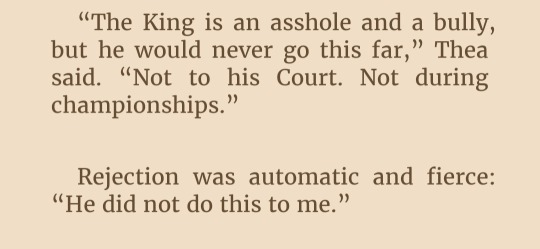
Also let's talk about this?


The rumours had gotten so bad that both the master and Kevin also believed Riko's words? How the hell was Thea supposed to know anything? She was a victim as well and it just annoys me so much when people use this to just completely stain her character and make her a huge bitch. She's literally a dark skinned woman. Even tetsuji told her that she has to work twice as hard because people wouldn't take her seriously. If she even had an inkling of an idea knowing what they did to him, she would fuck them up
Also the reason why no one batted their eyes was because the Ravens fucking eachother is completely normal. It's some sort of screwed up thing that's been going on for generations, even before Riko and Kevin had joined Evermore.
To the people who say Thea does not care about Jean I will literally chew your lungs BECAUSE HAVE WE BEEN READING THE SAME BOOK.


Do you guys not realise how close Jean and Thea truly were? Thea and Kevin were the only two that Jean actually had a good relationship with in the Nest. Just look at the text!! Thea is one of Jean's weaknesses because he trusts her so much, and we know that Jean always blurts out shit he's not supposed to when he's beside people he really trusts (Neil, Jeremy, Kevin)
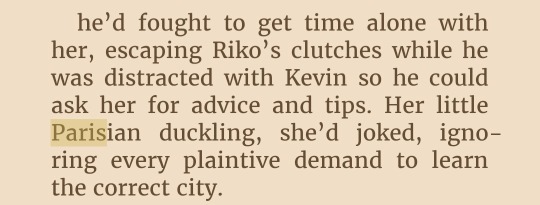
Her little parisian duckling! He literally followed her everywhere 🙁🙁 Gosh they mean so much to me. (Also, the reference to Elodie's duck dress and Thea's way of calling him?)
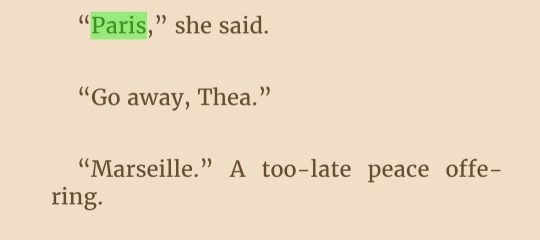
Last bit. I just find their relationship is just watered down SOOOO much because people hate Thea for unconventional reasons. You can dislike her character for sure, but I feel like a lot of people have so many misconceptions about her so I just wanted to clear it up!!
Please Nora give us more Thea and Jean in TSC2 😔😔😔
Edit: Sexual grooming is the action or behavior used to establish an emotional connection with a minor under the age of consent and sometimes the child's family to lower the child's inhibitions with the objective of sexual abuse. This is the definition of grooming btw and it's confirmed that Thea dated two other people when Kevin was a minor and didn't think of him like that until he was a freshman in college ie 18 years old?? It's completely different because she wasn't even pursuing him at all??
#aftg#jean moreau#thea muldani#kevin day#the nest#her little parisan duckling#i will never be over that#they are so sibling coded#they mean so much to me#something about strong woman protecting her little brother that she adopted off the streets like a kitten#get behind me thea
116 notes
·
View notes
Text
Welcome back to the Ineffable lyric discussion (can I hear a wahoo)
In honor of the announcement of season 3 of our beloved Good Omens, I find it completely necessary for us to discuss one of the many songs on Aziraphale and Crowley's angelic playlist that made me scream my bloody head off. One of those songs is the one and only The Book of Love by Peter Gabriel. While I UNDERSTAND this song may have just been chosen to spell out SEASON THREE, I think it goes much deeper than that because of all of the parallels it draws to Aziraphale and Crowley. And ultimately, what I think is going to happen in terms of their relationship when they finally sort their shit out. So beware if you haven't watched season 2 of Good Omens because we're about to do a fucking DEEP DIVE into this.
First, the title of the Book of Love feels almost like a call to this looming threat to the Book of Life that was consistently used in series 2. The entire season, Crowley and Aziraphale have to work oh so carefully because with the Book of Life being confirmed, they know that either of them could get the other erased, and whether they want to admit it or not, losing the other is their biggest fear. We've seen this when Crowley believed Aziraphale to be dead in Series 1 when he couldn't feel Aziraphale's presence anymore since he got incorporated. When Aziraphale isn't there, Crowley is a mess. Likewise, we saw how both reacted during the ineffable divorce scene in series 2. Crowley is full-on begging Aziraphale to stay, and Aziraphale has finally admitted that he needs Crowley and full-on mouths for Crowley not to leave him. The Book of Life inherently, from how Neil set it up, feels threatening. The Book of Love, on the other hand, raises an entirely other reaction. Throughout the series, as corny as it sounds, love has been what grounds our protagonists. It is the love of Tadfeild and his friends that keeps Adam from kickstarting the end of the world; it's what keeps him from rejecting his father, the literal devil. It is the love of the earth, of humanity and all its strange creations, and for each other that keeps Aziraphale and Crowley attempting to prevent the end of the world when it could be so much easier to just accept the fate of it all. Love is the key theme that grounds our protagonists, that makes them tick. Love is safe; love is, at times, painful but overall kind. So when we see this title on their playlist, listed amongst heartwrenching tales of grieving a relationship, you could have had, and of loss, it brings a sense of salvation and safety. The Book of Love, unlike the Book of Life, is not a threat- it's a sanctuary for Aziraphale and Crowley.
Now, diving into the lyrics.
"The book of love is long and boring
No one can lift the damn thing
It's full of charts and facts, and figures, and instructions for dancing
But I
I love it when you read to me.
And you
You can read me anything"
The first couple of verses inherently feel like Aziraphale and Crowley's original view on this notion of love. As two supernatural entities who aren't bound by human emotion or logic, love may seem superficial and downright silly at times. The courting procedures that different societies have taken on throughout the centuries and the songs and dances that come along with it may all seem like a big waste. The book of love is a manifestation of love itself, and originally, it seems unappetizing to our protagonists. That is until they refind each other, and love goes from this thing that humans feel and jump through hoops for to this tidal wave of emotions. Love felt silly and unrealistic before, but with each other, they are willing and excited to explore it, even if it comes with things that feel inherently silly.
Also, these verses draw some cute parallels to headcanons and features of cannons. If you've been involved in the Good Omens fandom long enough, you've probably stumbled across the idea that Crowley asks Aziraphale to read to him for a multitude of different reasons. Some people say it's because his eyes aren't meant to read, one of the many punishments that came with him being cast down from grace, or maybe it's just because he finds Aziraphale's voice comforting. Additionally, the line about instructions for dancing is just so heartwarming when we look at the ball scene from this past season and Aziraphale's daydreams of a romance worthy of a Jane Austin novel.
"The book of love is long and boring
And written very long ago
It's full of flowers and heart-shaped boxes
Adn things we're all too young to know
but I
I love it when you give me things
and you
You ought to give me wedding rings"
I'm sure we've all heard this idea that you'll understand love when you get older, but even when you get older, it never seems to make sense. This idea that love is too old for any of us to truly understand, and that humbles us but in the best way possible. There is no point in trying to figure out what exactly love is because you could spend thousands of years feeling it and watching it happen all around you and still not know exactly what it is besides this all-encompassing feeling. And that is exactly the perspective of Aziraphale and Crowley. They have seen countless examples of love, true, unwavering love, and they have felt it for each other. And yet they themselves cannot begin to fathom what love, true unconditional love, is exactly. These two supernatural, ethereal/occult beings are humbled by the very concept of love like humans are- and that love is drawn from each other.
And then there is this notion of giving, which pairs so well with Crowley's primary love language, acts of service and gift giving. If the first chorus was Crowley talking about how he loves it when Aziraphale reads to him and takes care of him, then this is Aziraphale talking about how Crowley displays his love. And this final notion of asking for that final commitment, one of the key ways humans express their love for each other, is just amazing. Because in a way, Aziraphale moving to make this commitment, to fully be on their side in this way, is the resolution we have been wanting since the beginning. For Aziraphale to finally feel safe enough to let go and finally let himself settle to where he finally belongs, on his side with Crowley.
#good omens#michael sheen#neil gaiman#david tennant#go2 spoilers#good omens season 2#aziraphale#go spoilers#crowley#good omens spoilers#good omens playlist#good omens 3#good omens season 3 confirmed#oh my god its happening#everybody stay calm#I went overboard again#this is my roman empire#and i will not apologize#neil gaiman you did this to me#and now michael sheen will somehow find this#because he is literally EVERYWHERE#hi michael#ily
414 notes
·
View notes
Text
I am on episode 2 of season 2 of Kevin Can Fuck Himself and there is something I have to say because it's breaking my heart. And it's about Allison. Look, I know- we all know- she's far from perfect: she is messy, impulsive, she can be manipulative, controlling, she often lies, puts others in danger in order to save herself without thinking twice; you could say she emotionally blackmails Patty into looking into Tammy's notebook, the first thing she does after hitting Neil with a boiler is making sure she can pretend she was making tea with that rather being like "Oh shit I may have killed my friend's brother". I know about all of this, we all know.
But I still can't in my heart root against her or understand people root against her because in this show there's not one fucking person who actually tries to help her escape her abusive marriage. It doesn't matter if they see Allison's and Kevin's marriage from the outside, or if they're present during acts of abuse or if they hear Allison scream in their face she needs to get out, they don't care about her.
Patty is the first important character to know about the abuse first-hand and because Allison explains it to her that she is being abused, that Kevin is trapping her, stripping her of possessions, of ways to leave him, of her life. And Patty does help Allison, a lot, because they're sort of trapped together in the same mess, but there hasn't been a moment yet in which Patty goes "Yeah we are going to help you leave your husband". You would think, in a perfect worldn after Patty actually takes into consideration the abuse she has seen Allison go through she would be like "Okay, my first priority may be sorting my own shit with Oxy, but after that we're getting you out of that house." No. If Allison didn't push to get out, in ways that may be questionable and exploitative of others, for sure, Patty wouldn't be the one to say "let's get you out of there".
Allison speaks to Sam. What does Sam says? That Kevin's an idiot. He doesn't want to get Allison out of town because he recognises that leaving the city, putting physical distance between her and her husband, may be the only way for her to escape abuse. He wants to live some sort of love dream, that seemed to me as much - if not more- about leaving his wife's overbearing family as it was about being with Allison. And when she doesn't want to run away with him, he is not interested in helping with her situation anymore. He refuses to give her a job, which strips her away for the little economic autonomy she could have had, and it's not like he says something like "but I'll look out if there are other places that are hiring...". And yes, I do understand that she often acted unfairly towards him, that she always had the emotional upper hand on their relationship, dictating its terms every time. But that doesn't cancel out the constant and apparently inescapable abuse she is submitted to in her daily life. She still needs help for that.
What about when she confronts Neil? Neil who knows what's going on. Neil who has often taken part in that abuse, who has fawned the flame at every given opportunity and knows what kind of guy Kevin really is? He berates her for always whining. But yeah, what can you expect from the guy who was going to kill her.
And Diane seems to function as this idea of what Allison may become if she doesn't do anything a put her marriage, she is the wife who is more or less totally submitted to her husband and doesn't even rebel anymore, doesn't even think she has a right to rebel. So of course someone who has grown so accostumed to abuse to believe it is the norm is not going to help Allison get out of her abusive relationship.
And really everybody until the point I have watched (ep2 s2)- every random side characters who has witnessed Allison's abusive relationship, has heard about it from her or has had a hint that there was something off about that relationship: the police officer who stopped Allison and Patty, Nick, the PI- didn't give a single fuck about it. None of them thought "maybe I should help her, maybe I should do something." Not even a little thing, not even, fuck, spare her from one of Kevin's insults just once.
When Allison says she tried to kill herself (which is understandable, given her situation, given that death might be the only way out), Patty tells her "You're playing the victim." No shit, she is the victim. Yeah, even if she acts shitty towards people, even if she often acts selfishly (in self-preservation, may I add, since nobody else seems interested in preserving her otherwise), she is still the fucking victim. And nobody wants to recognise it and, even when they do, nobody wants do anything about it.
Everybody would be more than fine if she kept bearing the abuse in silence.
"Well, if she didn't act so shitty all of the time and if she settled for a less questionable solution than killing her husband, maybe people would sympathize more with her and want to help her-" It doesn't fucking matter. It's not a victim's duty to look palatable or innocent enough so that they may deserve help. Her husband's compromised most of jobs, forced her to move in with him, and he's more than ready to call the cops on her when she tugs on her leash just enough for him to get a sense she may be sipping away and there are people debating that if she only were nicer about her life being taken away from her own hands maybe someone would feel like doing something.
It breaks my fucking heart that the abuse she suffers from her husband is the core of the show, going by the title alone, and nobody does a thing to help her. Nobody. Nobody gives a fuck if she lives or die or she isn't seen anymore or if Kevin buries her in the backyard or he keeps her chained at home or nobody hears from her anymore. And I know- as Sam said in one of the first episodes, I believe, and as it was explained in Ted Lasso- that a victim may still be held accountable for the relationships they pulled out from; that it doesn't matter the reason, if you disappear in your friends's life all of a sudden you're going to hurt them, so let's say Allison alienated all of her former friends, because they all thought she was a bitch and it was 100% a conscious choice of her to abandon them.
There are still so many people in the show that overlook what she is going through. It reminds me of that scene from "Why Women Kill", when April goes on her "I Hate People Who Look The Other Way" monologue, about her mother being abused, and everybody in the family knowing it, and nobody doing anything.
I feel that's what everybody does in this show. They look the other way. They don't care. Only if Allison shouts and goes crazy and tries to kill herself or her husband they deign her of a minimum of attention, and even after that Allison being in very real danger is always the least important matter. Everybody in that show has their own interest to look after, but that's not an excuse. There, I said it, that's not an excuse. That's not enough.
Fuck do I know that you can't take care of everything, that you can't solve every world issues, but if in front of you you see someone who needs help, who is begging for help, you can see them and you turn in a blind then what. What are we doing as people. Everybody saw Allison being abused, everybody knows and fucking nobody does anything. Helping eachothers out is all that we were put on earth to do. And none of them, none of them decides to mind his own business because they don't know how to help, they believe they could make things worse- they just don't want to. They don't want to help and they don't care. I don't know who would be sad if Allison died by Kevin's hands, what I do know is that none of them would certainly be sad enough to move a finger for her.
You think Allison is self-serving? Show me a selfless character in this show. The closest we get to this seems to be Patty- who I like, she's probably my favourite character, and she does a lot for Allison, but if Allison didn't one day decided Kevin deserved his life to be taken away more than hers she would not have done a thing.
Allison's not perfect, I very much know. She often acts in bad ways, she takes bad decisions. But I don't think any of the other characters have a right to judge what she does while they were busy looking the other way.
#and I mean anybody. Yes my beloved Patty included.#I am sorry this show is a lot. It's a lot for me to take in. And this was eating me from the inside I had to write it.#kevin can f himself#kevin can f**k himself#kevin can fuck himself#allison mcroberts#tw abuse
79 notes
·
View notes
Text
Sally Face HC's (How they are at a New Years Party!)
A/N: Happy New Year everybody! I hope everybody has had a good break and may this year bring great things! I have many goals for this year so leave yours below!
C/W: It does include 1 mention of Sal’s mom and dad so if that's a sensitive topic then don't read. Thank you!
Leave any suggestions if you want to see something specific!
------------------------------------------------------------------------------
Larry Johnson:
First off he’d be the one to host the party with everybody. I believe that once they are all older (with Sal moved out of the apartments with Todd and Niel), the main party would be held at the apartments for nice memories of the group.
You have to go big or go home, so the entire basement would be decked out for everybody to hang out with mini sections.
To respect the other residents of the building, a sign would be put down to go to the basement in which the party would be located. (By the help of Ash of course).
Once I entered the basement a big sign of: “Welcome 2025!” with some goodies such as glasses would be on a big table and enter Larry's apartment.
Larry himself would be a live, energetic host who makes it a point to say hi to everybody most of them he knows personally. However, those that he doesn't know (such as friends of Ash or Todd) he will welcome in like family as if he's known them for years.
Kind of like that Uncle you only meet once every tradition which you aren't even sure he’ll show up but you love him on the spot?
Definitely has some tricks up his sleeve for the party to make it more entertaining. What are those? Some are more noticeable than others such as the “Fruit Punch”, but others such as a pranked toilet will take a while.
The type of dude who is very persistent at seeing the ball drop, but when it does he either: A. Miss it, or B. Sleeps and doesn't even wake up when everybody is sleeping. There was one year where he didn't miss it (Claimed by him), but there is no hard evidence supporting this.
------------------------------------------------------------------------------
Sal Fisher:
Sal isn't the type for big parties, he never was. But hearing that everybody he enjoys being around is going (plus the idea he doesn't HAVE to stay the whole time) he decides to go.
Being the person he is, he shows up on time with Neil and Todd; since they are early they decide to help out with the minor details with Lisa. (Such as cleaning the tables, glasses, etc).
Ashley has him help out with also putting up the posters making sure that they are held up and not crooked.
Honestly, all I can see him doing is talking with the people he knows until they decide to have some of their own fun with other substances around them, which then he hangs around in the corners of the room.
But he does make a few small friends from the parties with people who are like him!
With the ball drop, I think he thinks it's quite interesting, not like a huge die-hard fan of seeing it but he enjoys spending time with his friends around him and being able to cheer/spend that precious moment with them.
At the time it's bittersweet since the first thing he may think of is his family, which includes his mom and dad.
Overall, besides that factor, New Year's Eve is an enjoyable holiday :).
------------------------------------------------------------------------------
Ashley Campbell:
I feel like she is one of those people who LOVES New Year's Eve for several reasons.
Parties; She was a big factor in having this party in the first place and helped Larry convince Lisa to hold the party at the apartments instead of at Sal’s house.
Second off; It allows her to see everybody again since she moved away :).
Third off it's just a fun holiday overall!! She is one of those people (like me) who sets goals for the new year and makes a vision board so being able to have a sort of “reset” and “fresh mind” is nice.
She shows up a little bit later than everybody obviously since she doesn't live close but still shows up before the big wave.
As mentioned above, Ash contributes a lot to the party decorations such as making the signs and 2025 party hats and buying stuff at Dollar Tree for the glasses.
She also contributes to drinks, which I believe she likes more fruity juice so that's what most of it will be :P.
Most of the people there will also be due to her as by her friends from Art School. (She will claim it is a “small crowd” and then 20 people show up LOL).
Due to her loving New Years, she will be very keen on seeing the ball drop. I feel like when she was younger she didn't get to see the ball drop because her brother had to take care of him and made sure he went to bed (even though he also wanted to see it), so now with free will she's doing everything to the max.
Definitely will not be riding home that night and be part of the crowd that stays at Larrys till the next morning.
#female writers#shnoob#writers on tumblr#creative writing#larry johnson#sal fisher x reader#sally face#sal fisher x y/n#sal fisher#sal fisher x you#ashley campbell#party#new year#sally face fandom#fanfic#sally face headcanons#sally fisher#fluff#sallyface#sally face fanart
43 notes
·
View notes
Text
I have written many meta posts and s3-theories, and read even more, but I got hit by an idea I have not seen before. (If there is another post, please link it!)
After vibrating for an hour and losing my mind in my dms, I have no scraped together enough brain cells to present what is probably my first actual 'main-plot meta'.
Welcome to another edition of Alex's unhinged meta corner, today with a title to honour Crowley's James Bond obsession and the possibility of another heaven heist.
I give you:
From Jesus with Love - You Will Live Twice
Now, let's get right into it.
I think Neil might have told us more about the main s3 plotline in the announcement article than we previously thought. We all got stuck on 'they're not talking'—for good reason—but it is the part before that which has been bugging me ever since then.

The plans are going wrong—and this time that is a problem for earth and humanity. Turning that around, it means that whatever that plan consists of would be the way to go and beneficial for everyone, the opposite of the main plot of s1.
"They need to prevent the Second Coming (SC)" is pretty much the only and most popular idea I have seen, hundreds of fics and metas and whatnot have been written about it, but I think there's a good chance we're wrong. If we're not, well, I will honestly just be happy to be watching season 3.
Whatever the Metatron is planning will have negative consequences for everyone, or as Michael puts it: "And so… it ends. Everything ends. Time and the world is over, and we begin Eternity… forever and ever."
It sounds very much like Apocalypse #1 - Same Old Plan, same expected result, yet if we look at different interpretations of scripture we find that the SC is not entirely about complete destruction and death for all of humanity—it is about creating a new world/migrating to the kingdom of God.
This is taken from the Wikipedia article about the SC

Resurrection and life in a world to come are a direct contradiction to the result Michael is explaining—total annihilation of humanity.
Now, I am neither religious in any way nor have I ever received any sort of biblical education. Luckily, Christians seem to love talking about the bible because there are dozens of bible website to wade through. If I get anything wrong, please point it out, I have never touched a bible in my life.
So, after reading many, many quotes by a bunch of different guys, I tried to create a somewhat coherent picture of what the SC might look like based on the assumption that the end result is positive. I will talk about how they can be interpreted more in-depth later, otherwise this would turn into a string-net very fast.
Additionally, we can also see where these points overlap with the statement Jimbriel gave in the bookshop in episode three.

What is Jesus' job description?
only God knows when and how exactly it will begin/happen, no one else does, including Jesus and the Metatron
a lot of different catastrophes are mentioned or quoted as something Jesus said, like earthquakes and storms -> Jimbriel mentioned a tempest and great storms
there is also the line "All these are the beginning of birth pains." Birth pains dictate that there will be a birth—birth of the world to come perhaps?
dead people will be resurrected/leave their graves so that they too can be judged (I'd say participate in it but that sounds like the Second Coming is a summer camp activity)
there are also mentions of stars and the heavens in general falling from the sky and the sun going dark -> Jimbriel also mentions darkness as one of the signs
great lamentations, as Jimbriel says, are also a part of many different passages, with humans mourning the world as it was
the Lord will descent with the voice of an Archangel and the sound of a trumpet/the trumpet of God; the grammatical structure of that sentence seems to be interpreted differently depending on who you ask, but the voices of angels/an Archangel and some sort of trumpet are common terms
once everyone is in heaven/wherever the 'main even' will take place, a judgement call will be made for every single person in relation to the book of life, which decides whether they will be punished forever or not (one passage talks about a lake of fire and mentions it several times in a row)
And this is where it gets tricky. To figure out what the SC looks like, we first need to understand a) what the Metatron's capabilities are, b) what he has to lose, and c) what exactly would be a threat to him.
If you ask me, all of this comes down to the Metatron wanting to stay and be in power for eternity with full control over angels so he can do as he please, aka keeping the system running as it is.
We know the book of life (bol) is a thing in the Good Omens universe, whether it does what Michael said is an entirely different question. So far, we have also only got confirmation that hell collects and tortures souls—in such large amounts that they are understaffed—while heaven looks completely empty.
The Metatron runs heaven as an institution, he seems to be the highest power any of the angels have access to and the one they defer to. He refers to himself as the voice of God and combines judge, jury and executioner, making him one great celestial dictator.
From what we know of hell, they do things a lot more democratically, having different councils, dukes, and ranks that are responsible for different levels of command.
We also know that that the Metatron wants the world to end, his goals can probably be summarized as the statement Michael makes, which would leave him in charge without any opposing forces.
We also also know that he sees Crowley and Aziraphale as a threat—why exactly remains a mystery for now—and that the success of his plan hinges on having a Supreme Archangel (SA) he can control. Gabriel decided to become princess of hell and Beez' sugar baby, so he was out of the equation, and after the Armageddon disaster, I don't think he wants to risk failing because of an unfamiliarity with earth (plus, y'know, getting our two idiots away from the plan).
It's interesting to me that right at the end, he says to Aziraphale "We call it the Second Coming"—call, not it is or it will be, CALL. We know that nothing Neil writes is a coincidence, definitely not with such an important line.
Just because you CALL something a specific name doesn't mean it IS what you call it, e.g. Aziraphale calls Crowley a foul fiend when we know he very much isn't.
The Metatron is selling his plan as part of the "Great/Ineffable Plan", so any questions can be blocked by saying it's God's will, it's ineffable. Whatever his plan is, he hides it behind the concept of the Second Coming, which angels know just enough about to understand the basics without having in-depth knowledge of what exactly it entails.
It is a good fucking strategy, I'll give him that, and it WORKS because angels—even if they have doubts—do not question. They simply don't; fear of punishment and millennia of conditioning have left them in a horrible place. When they encounter something unknown, their response is "I already knew that" as to not ask questions.
Crowley questions, we know that, and Aziraphale, ohhhhh, Aziraphale ALSO questions, but he does it in a less dangerous and obvious way. The Metatron is vastly underprepared for that.
(Side note: That alone would be its own meta post, but the gist is that he questions heaven's plans and then adjusts his assumptions of what God might want to what he WANTS God to want, e.g. Job, the Arch)
To summarize everything I just said, the Metatron wants to do what Armageddon failed to do—destroy earth and the universe—so he can be supreme dictator of all remaining celestial beings and gorge himself on power.
But instead of calling it his Big Evil Plan, he calls it the Second Coming, making everyone play along without resistance.
We cycle aaaaall the way back to the sentence I quoted—the ACTUAL plans are going wrong since the Metatron's would mean total destruction.
But what is the SC supposed to be if not the Apocalypse 2.0?
When I look at all the different aspects of the SC and assume a positive outcome, then the end result to me would be a new world that is pretty much like the old world, or maybe even literally the old world but with any destruction reversed. Heaven and hell get dissolved since now that everyone has been "judged", they as institutions are no longer needed, they have fulfilled their purpose.
No more judgement means there is no reason to keep track anymore, so why do you need to run celestial corporations whose only job is doing exactly that? You don't—and THAT is what I believe is the biggest perceived threat to the Metatron, losing full control over everyone and everything, losing his position, his title, and whatever else he has.
On top of that, Good Omens has told us again and again that God doesn't seem to give a fuck about good and evil anymore, and that without heaven and hell being all wrapped up in it, humanity would have 100% free will without any consequences.
Maybe the BoL is empty, maybe it isn't real, maybe Jesus stole it to straighten a wobbly table, who knows. There is a chance it is what Michael says, but I would admittedly find that a bit. too obvious and boring since it would boil the plot down to "they save their own asses again" and not "they save humanity at all cost".
Regarding Crowley and Aziraphale's role in this—I have Thoughts TM but those definitely need their own post. In short, they have to get the SC back on track, the real one.
-
If you have made it this far, thank you for working through what I hope are more or less coherent rambles. Any spelling or grammar mistakes are my own.
Questions? Thoughts? Corrections? Expansions and additions?
Feel free to add to this post however you like (and I can't believe I have to mentions this but if you clown on my post or behave like an asshole you will be blocked).
#alex talks good omens#good omens#crowley#aziraphale#good omens meta#good omens season three speculation#good omens season 2#go2#aziracrow#crowley x aziraphale#ineffable husbands#ineffable wives#ineffable spouses#ineffable divorce#the final fifteen#good omens s3#good omens speculation#good omens theories#metatrash#the second coming good omens#long post
196 notes
·
View notes
Text
ok calling out tumblr as a whole rn, gonna keep this reallll brief and simple
Leave. The Neil Gaiman fandom. ALONE.
are the takes coming out of it right now rancid? Yes.
It has been LESS THAN ONE DAY.
LESS. THEN. ONE. DAY.
Everyone rn talking about how they “already knew” and then using that as justification to engage in the WORST, MOST PERSONALLY INSULTING, DEGRADING, HEARTLESS, DEHUMANIZING, AND *CONSISTENTLY FUCKING ABLEIST* BEHAVIOR I HAVE EVER SEEN ON THIS SITE
All y’all need to step back and remember when and how you DID learn this about Neil, or about powerful people/celebrities in general. y’all know you didn’t process it instantly, cleanly, or without any emotional turmoil, grief and deeply bad takes on the way to acceptance. And I’m sure the vast majority of y’all have SOMETHING that you like right this instant where you “separate the art from the artist”. This isn’t a “gotcha”, that’s LITERALLY JUST A NORMAL PART OF MODERN MEDIA CONSUMPTION
and even if you’re some pure untainted angel who only likes things that were entirely created by good people and has the ability to instantly detach all emotional, artistic and other ties to a piece of media once it becomes Bad(tm)….
You still have no right to treat these ppl like this. Plain and simple. These are the reactions of people who just had their view of their favorite author shattered
YESTERDAY
and while some will inevitably stay and defend Neil (fuck those guys), the majority WILL process this and react appropriately, just like I did, just like yall did.
(and if “appropriately” turns out to involve taking back the fandom en masse… listen I’m leery on it too but I think it would be a genuinely good idea to try. Interesting if nothing else, and absolutely not a cause for further hate) To treat entire fandoms this way, this immediately…. I am hundreds of times more ashamed to share a fandom, a website or a PLANET with y’all than with the ppl saying stupid shit while processing this stuff for the first time. The news itself was upsetting but unsurprising. Seeing y’all turn into Reddit chuds projectile vomiting anti-autistic stereotypes and telling people to off themselves is making me genuinely fucking sick.
I’m so angry. All this finally coming to light and you’ve all chosen hatred. Fuck you, fuck all of you. I don’t even have words.
Edit for clarification: I am NOT asking that Neil or his fans not be held accountable. I am asking people to have the basic fucking human decency to give the fandom ANY TIME AT ALL to process this stuff before rolling out the personal insults and su*c*de baiting.
Give People Time To Sort Through Their Feelings. Let People Process. Not forever, just a few days. Most likely yall didn’t process this instantly when you first learned about it, so stop expecting others to. Don’t be dicks. That simple.
EDIT TWO:
This post is NOT calling out criticizing people who defend Neil. Again: FUCK THOSE GUYS. This is a post calling out the massive amounts of hate currently directed at people who are just fucking upset, who believe the victims and feel furious, betrayed, etc, and yes even people whose first thoughts were of their fandoms. If they aren’t defending Neil, they aren’t defending Neil. In fact if they’re being weird and messy about fandom or internal stuff, it’s pretty clear that they’re FUCKING FURIOUS at Neil.
In fact, perhaps consider redirecting all this hate to the people actually defending Neil, instead of people who obviously hate him but whose processing methods are kinda cringe.
73 notes
·
View notes
Text
Dead Poets Society boys headcanons I thought of while showering: showering edition (sounds ironic)
Charlie: bro uses an IRRATIONAL amount of shampoo. Most probably has finished one entire bottle in a matter of 4 days before (shampoo prices must not be an issue for him, I guess). His hair somehow isn't damaged, and not even god knows why. Takes an hour for him to finish showering. He talks in the shower, and if it's in Hellton showers he will talk to someone else while showering (Knox and him get idiotically philosophical; call it shower thoughts that are actually spoken)
Cameron: this mf measures the amount of shampoo he uses. I never knew someone who did this, but I can DEFINITELY GUESS that Cameron has a measuring cup just for shampoo. His showers are short compared to the others, probably because he doesn't think about other things rather than to finish showering. Uses more hair products outside the shower (the youngsters would call it 'styling').
Meeks: he's a little more normal. But DEFINITELY has realizations while showering, it's just that he doesn't say them out loud. Suddenly his mind speaks to him about how to set up the DIY radio to work or something like that and he won't talk to anyone after the shower until he has it sorted out (will go RUNNING like he's running out of time to tell Pitts). Probably 25 minutes long showers because he also uses a product to keep his curls okay.
Knox: who told this dumbass that putting on perfume while the water is running and he's still showering is okay? Multiple people had told him that IT DOESN'T MAKE SENSE, but he's like "no, guys, I swear it works... because the other day-", and he's mentioning an event that has nothing to do with putting on perfume in the shower. I can imagine one of his talks where he goes OVERLY philosophical and Charlie just tells him that he's 'talking stupid'. He takes (slightly) less than one hour just to not be called the one who takes the most time in the shower (a.k.a Charlie Dalton)
Neil: WHO put theater kid music in here? Social anxiety fears this dude. Not only he sings his favorite musicals, he also mumbles the dialogue for his next play. I'm certain that more than 7 people in Hellton have memorized at least one line from his dialogue just by listening to him (even if it's mumbling people can still hear him). Takes like 40 minutes for him to finish showering, and most of it is him trying to remember his parts in the play (sometimes Todd, who has them memorized after reading the script multiple times, tells him the next word and Neil yells it with excitement in an 'eureka' type of way). I think he would do a little skincare while showering, maybe just one product to clean his face and then wash it off.
Todd: always takes him 19 minutes straight to finish showering, some of the poets wonder if he has a watch to know when to come out (it has been proved scientifically that he does not take less or more than 19 minutes). Has a panic attack every time the soap slips. For some reason also uses conditioner... Who told him that he has to use it? I don't know (your hair isn't even that long, dude). Has the typical writer struggle of having an awesome idea but not having anything to write at the moment (has suffered the pain of forgetting what the idea was). Unlike the other poets, he does not do much after showering rather than brushing his hair and then dissociating (partially canon, I guess)
Pitts: he tried to get the shampoo out violently once, and it ended all over the place except his hand. He's more conscious about it now and it didn't happen ever again since then. He's a thinker, but not a philosophical one (like Charlie or Knox) or a genius one (like Meeks). His thoughts range from "did I turn off my desk lamp", to "TRIG HOMEWORK IS DUE TOMORROW AND I DIDN'T FINISH IT YET". Awfully specific but probably uses two brands of shampoo (I don't know where the idea came from but I can see it). Takes him a little bit more than 25 minutes to finish showering but does not usually reach 30 minutes long showers.
I don't know where all of these came out of.
#i swear my headcanons are a little more normal#(sometimes)#dps#dead poets society#todd anderson#neil perry#gerard pitts#steven meeks#richard cameron#knox overstreet#charlie dalton#dps headcanons#dps boys#grae's old interests<3
105 notes
·
View notes
Note
I didn't like when andrew said renee was useful?
Like weren't they friends idk it sounded weird
Okay maybe this is me being the big ol Andrew Minyard apologist that I am but I’m not sure he means that in the way that it seems. Prepare yourself for my silly thoughts:
Andrew and Neil got to this place in their conversation by Neil asking how Andrew can be so disconnected from his teammates. Neil feels he has to let them in, let them be his "friends", let them get to know him. So how has Andrew managed to keep them at such a distance, to avoid letting them in? Because he doesn't want to. Andrew just says they're not interesting enough.

Neil is already wondering what's going on between Andrew and Renee at this point. So he sort of backtracks on himself then - Andrew actually has let people stand in, and Renee is one of them.
And Andrew knows everyone is betting on him and Renee. He’s quick with the, “You expected a different answer?” because I think he knows there’s a high likelihood somebody has told Neil about this bet, and given Neil’s “That’s it?” I think he could also tell that Neil thought that him and Renee could’ve been a thing (or at least that that was the only way he could make sense of their relationship).
Andrew is quick. We know he is. So I think he would've realised exactly what Neil was curious about when he mentioned her name and then said "She's not interesting?" (Which really means “Is she different?” Or “Are you actually more than that and not saying it?”)
Then right after that, there's this -

Andrew thinks it's obvious. Andrew calls him stupid, Andrew mocks him. Andrew knows why he's asking about Renee. He thinks Neil is stupid for not realising why it wont happen. He lets Neil squirm for a bit because Renee is his friend, even if he won't say that, and this just opens up the opportunity for Neil to actually talk to her.
I think he said "She's useful," because he's not going to say "She's just my friend," or "She's like me," or whatever else he could've said. Andrew is not the type of guy to turn around to Neil’s question and say ACTUALLY you are right! My friend Renee IS interesting! I forgot about her!
I think that's literally Andrew's way of saying she is his friend. Also, bearing it in mind that he's still medicated at this point - I don't think he means it in the way of "she's not my friend, she's just useful to me", but instead means it like "she just my friend, nothing more, and she's useful.” I think it’s a meaningless throwaway way to describe her. But even if he did mean it, he doesn’t mean it in a negative way. Not “Yeah. She’s useful I guess. She does things but that’s about it” but “Yeah, Renee is useful. She’s there if I need her” instead.
Does that make sense?
(And also; it’s Andrew we’re talking about. He tells Neil he hates him. I don’t think him saying that about Renee is to be taken too seriously)
But
I do actually think in some ways he means it when he says she’s useful. Renee is useful to Andrew.
She’s the only person on the team who has related to him. She the only person, before Neil, who even had the slightest idea about what Andrew had been through. Renee is useful in the way that she’s someone for him to relate to. He sees himself in her, and her the same. They understand each other. Which is probably likely a first for him. Shes spars with him. She’s his wingwoman. She’s his friend. She cares about him. She talks to him like he’s a human. (She makes him feel like less of a monster) ((not that he cares)) She’s always covered for him in the goals, too, when he’s been too sick to play. I’d say that’s pretty useful.
Idk. I’m pulling things out of nowhere because I’m too tired to think but. Yeah I think Renee is actually useful to Andrew, but I also think Andrew is Andrew and he says things he doesn’t mean, or says things that actually mean something else ALL THE TIME. So i don’t think him saying Renee is “useful” is anything demeaning against her. I think he’s winding Neil up because he knows where his line of questioning is going/coming from.
#what a ramble I’m so sorry#ask#mine#Renee walker#Andrew minyard#im exhausted I have no idea if this is coherent at all
65 notes
·
View notes
Note
So this is a bit random but:
Dream as the hero in a Greek tragedy and Hob as an Arthurian knight.
Thoughts?
(You obviously don’t have to answer if this is stupid or you don't want to)
If I may riff a bit on this, since I don't exactly have a pre-made answer (it's not a line of inquiry I've really considered), I'd say this:
Dream is absolutely a Greek tragedy protagonist. He thinks of himself that way, he's written that way. A major, indeed central, characteristic of Greek tragic heroes is that their virtues in some situations become their ultimate downfall. No one is dying in a Greek tragedy because they're inherently bad or failed people. It is the essence of that Picard line, "It's possible to do everything right and still lose. That's not failure, that's life."
Dream's dedication to his duty is an incredibly familiar virtue for a Greek tragic figure. It is also the virtue that will lead to his eventual end (in this incarnation). At least, in the comic. We'll see in the show if that's the case, and I have my suspicions based on the story's structure that we'll be seeing some deviation or, at the very least, a more optimistic spin on Dream's end.
Neil certainly wrote Dream to be a figure from a Greek Tragedy too, ironic considering he's also the "deus ex machina" in other situations, being literally a creature of godlike (or superior) power.
As for Hob as an Arthurian figure.... I'm less convinced. And I have a lot of reasons why because I think a lot about Hob's relationship, or lack thereof, with the tropes of knighthood as explored in both canon and fanon.
Let me quickly say that for fanon, sure, absolutely. I've seen incredible, complex, lovely takes on Hob as a Questing Knight or suffering the throes of textbook courtly love (more on that in a second, because I do find that part at least plausible) or otherwise being a gallant and heroic figure.
However, this is fanon. Canon Hob is certainly made more romantic, and I mean much more romantic by the show with the whole missed 1989 meeting and Ferdie's inherent and overwhelming charm. But comic Hob is... hmm, let's say he also has his charm but he's deliberately quite rough, quite crass, more than a bit dim at times, and the furthest thing from protagonist let alone romantic hero material. I think comic Hob would laugh, perhaps a bit wistfully, at the very idea of being an Arthurian figure. Certainly the Hob of "Sunday Mournings" (the Ren Faire comic issue) would be outright derisive of the notion of himself as a romantic figure or a questing knight.
Hob bought his knighthood. I think it's something that bears remembering: he bought it.
(Let me very briefly aside say, as a grubby Yankee myself, I actually find his audacity and sort of "Ha! I got away with it!" humor in that moment incredibly charming. Fuck yeah, stick it to the nobility! Fuck aristocracy, fuck nobility, and fuck aristocratic mythology like Arthuriana that reinforces those power structures. Good for Hob being a peasant who bought his knighthood, something that would be all but unthinkable in the grand sweep of Arthuriana, which for all its romanticism is still pretty definitive about everyone belonging in their social place.)
Anyway, Hob bought his knighthood with money he made getting into early English shipping and with money made from being on the right side of Henry VIII dissolving the monasteries (which were corrupt but were also one of the only forms of social services available to common people at the time, it's an incredibly complex issue) and Hob is as unbothered by the moral quandaries of this as he was the moral quandaries of being a soldier or a bandit. Hob is the furthest thing from being a Galahad. I'm not sure he could even aspire to Lancelot at his lowest on Hob's very best of days. He's just not built like that that we see.
At least, until 1989.
Now, as I've noted elsewhere, Hob's story is fundamentally altered by this ever so minor change in the show of making him still in England in 2022, still presumably waiting for Dream about a block away from the White Horse! Now, this is some courtly love shit right there! My jaw dropped when I began to map out the implications, not just of his waiting but of his becoming a history teacher.
Comic Hob never became a history teacher. Comic Hob seems all but allergic to romanticism and nostalgia. Comic Hob's highest moment of romanticism is wondering what exists in the depths of the ocean and thinking that maybe reincarnation possibly exists.
1989 changes everything. Actually, we even have evidence that in the comic timeline, Hob wasn't even in England by, what, 1992 when Dream passes away? He's in America with Gwen and they've been dating for a bit when she takes him to the Ren Faire, which is the day after Dream died. This implies that Hob doesn't usually stick around England like he does in the show timeline. If that wasn't already clear from the fact that most of his professions throughout the glimpses we see seem to involve maritime trade (sometimes of the very worst sort). The guy is constantly on the move but he stayed in England for Dream for over 30 years.
So there, at least, I think we have the first tendrils of something for fandom to grip onto that Hob does have the potential within him to go on a 30 year quest for his lost love, which is very Arthurian. I think even Hob would be perhaps shocked at himself for this, perhaps alongside becoming a history professor, finally coming to grips perhaps with the history he's seen, learning to care about it, learning that there's more to himself than he thought.
Because Hob is a weird immortal. He doesn't do the things we expect immortals to do, like learn from his mistakes and become some sort of avenging superhero, or even accumulate enough money to not need to have a day job any more, to just utterly detached from normal human life. Instead, he seems to stay grounded in a normal middle class life for whatever era he's in (barring disaster or windfall) and just happen to stick at it longer than anyone else by virtue of his immortality. It's so bizarre in the most fascinating way, it's why I'm obsessed with him, because he stays so grounded in his time period and not in any sort of special superhero way.
But 1989 really brings into sharp relief that there is an element of courtly love to how he interacts with Dream, the Beatrice to his Dante, this figure who inspires him, whom he waits for, whom he changes for (even when Dream himself perhaps doesn't believe himself capable of change?).
There I think there's something to the notion of Hob as, perhaps, a budding figure of courtly love, if not full Arthuriana knighthood.
But more intriguing and, if I may presume, what I think you're perhaps getting at with all of this is: could Hob's Questing Knight perhaps in some way disrupt Dream's Greek Tragic fate?
Well, it's not really possible in either of those genres played straight but, in the original canon, Hob didn't wait 33 years for Dream to come home to him.
So really, in the most optimistic way I'd say, anything is possible.
#dreamling#the sandman#a couple of glasses of sake in I have no idea if this is anything but I hope y'all enjoy#hob gadling#sandman meta
115 notes
·
View notes
Note
Okay, we need to address what fucking time travel shenanigans not only get Henry into Pretty society, but also get his HJ7 there with him? Assuming he doesn't just make more of it, thinking that it's safe to let Hyde out now that he's in a city where he's not wanted by the police?
TIME TRAVEL. *slaps half a year worth of experience writing time traveller ocs* I have some ideas. say Bryson (literal Victorian Neil deGrasse Tyson) and Griffin (who I’m rather sure is based on Wells’ Invisible Man - and Wells is also famous for The Time Traveller) worked together on some sort of (incredibly dangerous but would that stop them the answer is no it would not) experiment— something something discovering alternate universes, peeking through time, trying to explore the expanse of the multiverse and the space-time continuum —that they wanted to show to Jekyll (possibly to prove their scientific superiority in these Frankenstein times, because Griffin absolutely would) once they believed it completed. the experiment, being not safe at all, malfunctions and sends Jekyll tumbling through into the Uglies universe/timeline.
regarding the potion: knowing Hyde keeps spare HJ7 in his cloak, and that Jekyll did fully threaten Hyde with the HJ7 in canon (and VERY much followed through), I’d think after the fire and everything, Jekyll starts carrying a couple around with him as a sort of insurance.
Hyde 100% tempts Jekyll into letting him out. no one has even heard of Edward Hyde here, and “there are people partying over in New Pretty Town all the time, Henry, so why wouldn’t you let me out?”. Jekyll probably also wants to see more of this world he’s found himself in, and what better way to satisfy that itch than through Hyde?
28 notes
·
View notes
Text
S1E6 – The Very Last Day of the Rest of Their Lives P1 - up to the dissolution of the Horsemen
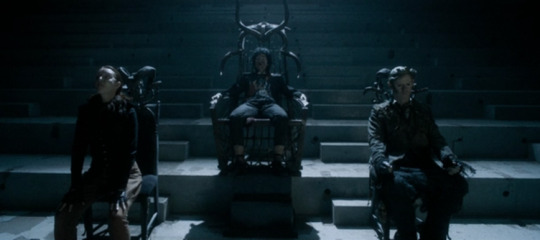
Well can you believe it? The last episode of the first season! And the first thing I want to make a note of is… the episode title. I really struggle to make sense of it because, linguistically, the only way something can be the very last of the rest of anything, is if it’s the very last of the thing at all. I can sort of make this idea make sense if I look at it from the perspective of the end of episode 5, where Armageddon is starting, and it does very much look like the world is about to end on that particular day, but it feels pretty woolly to me. Neil has been asked about this particular episode title before, but his answer did not help me wrap my head around the concept. In fact, it just made things worse:
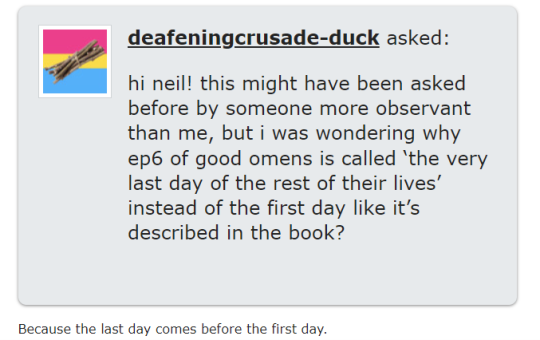
Nope. No, I’m sorry, but that makes literally no sense. Anyway, I don’t want to get hung up on the little details... Hey, didja notice how Crowley (aka Aziraphale) greets his trial panel in exactly the same way as he greets Hastur and Ligur in the graveyard?
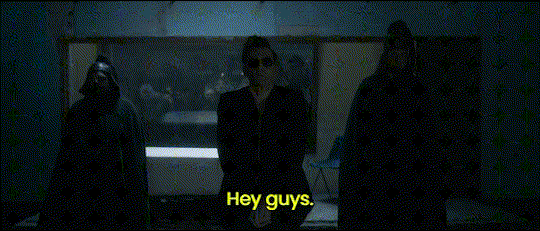
And that throw away line about getting some houseplants is pretty telling when you remember that it’s actually Aziraphale delivering that line (oh, spoiler alert there I guess, but I would have thought that anybody reading this far into the labyrinth of my brain wanderings is probably going to have seen this show at least once before). It shows that Aziraphale knows exactly what the inside of Crowley’s flat contains, and that the only thing he would care about enough to actually furnish a space is houseplants. One thing I do question though, is how Aziraphale would know who Hastur and Dagon are. He definitely would have known who Beelzebub is, saw her on the tarmac at the airbase in fact, but those two? I don’t know when he would have come into contact with them before, particularly in their demon forms. Crowley could have given him a description of as many of the named demons as possible I suppose, but it’s a bit thin as a theory goes. But more curious is presence of the montage at this point in the episode.
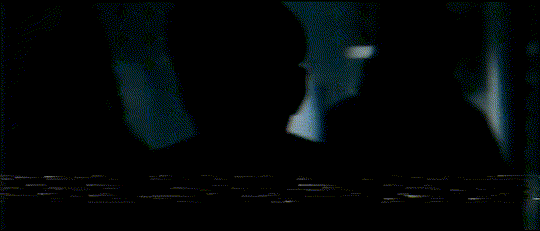
It’s just short of 7 seconds long, and takes place less than 2 minutes into the episode. It also happens to contain the entire storyline for the episode in reverse. Shots of Aziraphale (Crowley really) tied up in Heaven, Aziraphale and Crowley in the park together, the Bentley and book shop in their respective restored state, Adam with Aziraphale and Crowley complete with wings, Satan breaking through the tarmac – it’s all there. It even comes complete with those fuzzy little lines that you used to see when you were rewinding a video back in the days of VHS (yes, I do actually remember that) to show that we’re watching events in reverse. It’s not like we haven’t seen montages used to represent the passing of time in this show before, but this is the first time it’s been done with parts of the story that we, the audience, haven’t yet seen. It goes by pretty fast so it’s not like you’d be able to work out the plot by watching it in real time, but I think it’s a risky play nonetheless.
Next curious thing in this episode. The music playing from Crowley’s Bentley as he approaches the gates of the airbase is different to what we heard in the previous episode. It’s the same song, but it’s a different section. Not only that, but the music continues playing from inside the car after he closes the door, whereas in the previous episode the slamming of the door cuts the stream of music off abruptly. There is nothing else different about this rendition of the scene from the one at the end of the previous episode as far as I can see but it’s a subtle difference that I find interesting, especially when you consider how many of the beings involved in the events leading up to Armageddon come to have somewhat blurry memories of what happened.
I have to say, the depth of Crowley’s grief at the loss of the Bentley came as something as a surprise to me when I first watched this show.
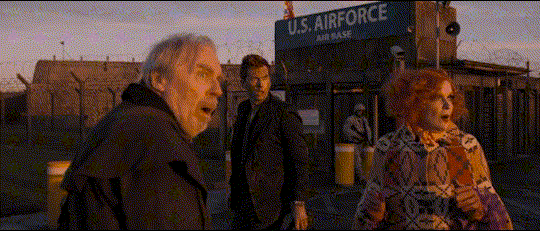
It’s true, we’ve seen him driving the car a fair amount in this season, and we saw him repairing the dents and other assorted damages following his collision with Anathema in episode 2, we even saw him giving it a pep talk as he willed it through the flames in the previous episode, but he talks about it here almost like a pet.
You were a good car.
But if I was surprised at Crowley’s response to the Bentley’s demise, I was more surprised at Aziraphale’s refusal to allow the demon to grieve purely because he still thinks of himself as “the nice one”. Well, mate, for someone who’s supposed to be inherently “nice”, you aren’t showing an awful lot of compassion here, and towards the being in the whole of existence that means the most to you too. Honestly, there are a lot of times I have been quite forgiving (no pun intended) of the angel’s behaviour because he genuinely believes in his own goodness, but I struggle with this. WHY IS HE BEING SUCH A PRICK? And who said he had to send the soldier anywhere (complete with magical miracle noise, in case you missed it), or harm him in any way? He could just have miracled the gun away, or slid him into unconsciousness like Death and Adam have already done with entire groups of soldiers. Is he just so used to Crowley doing all the footwork in situations like these that he’s lost the ability to think for himself? Or is it that him being “the nice one” is part of their agreed partnership, and that’s the role that the two of them have agreed he will play, not because that’s what he inherently is, but because that’s what makes the most sense and would usually be the most comfortable role play for them? Perhaps it really is the latter, because it’s not too long before we see Crowley make a conscious decision to resume the role that he is being expected to play.
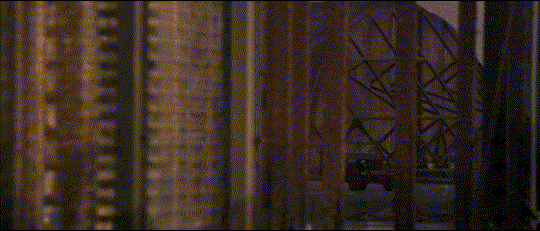
I can’t help but feel like the incoherent noises that Crowley makes are his attempt at trying to ask Aziraphale to deal with this next group of soldiers because he’s not done grieving. I should think he knows he’s pushed his luck on that front a bit too far when his bumbling is greeted with this look from Aziraphale/Madame Tracy:
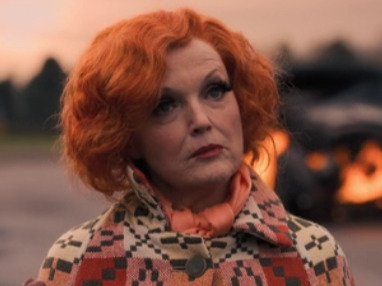
That is the face of woman/man/angel that is not to be dicked about with. And he knows it, giving himself a pep talk and asserting his position in a way that almost makes it sound like it was his idea in the first place. Almost.
Side note: there are a couple of lines missing from the original script here that I feel very sore that we didn’t get to see:
CROWLEY: Aren’t you going to introduce me to your new body? MADAME TRACY/AZIRAPHALE: Yes. Right. Madame Tracy, this is Crowley. He’s… Well, we’re sort of business associates.
Sad as I am that we didn’t get to see those lines, the tirade of double entendre from Aziraphale telling Shadwell to brandish his weapon so that they can “lick butt” almost makes up for their absence. Watching Crowley’s physical reaction because of his choice of words goes the rest of the way.
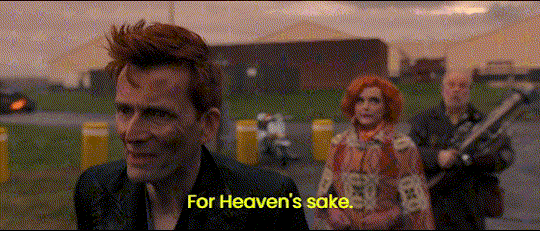
It’s interesting that he manages to use this phrase at all, even if it not only looks but sounds as if he’s about to throw up; he couldn’t even bring himself to say the word “Heaven” when he was screaming in the book shop earlier that same day.
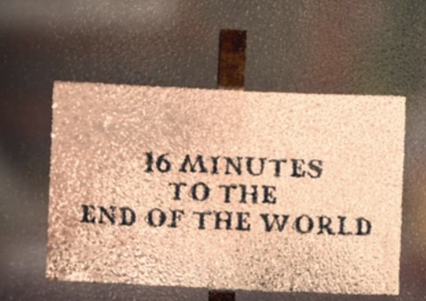
Quick note about R.P. Tyler: this really is one strange little individual. He seems to think that a child causing damage to some plants is equivalent to that same child waltzing into a highly classified military air base. Eejit.
We’re taking a quick visit to the soundscape again, inclusive of an Easter egg. I am in no way surprised at the use of a harmonica at the beginning of this scene, particularly given the stage directions provided in the script:
The feeling here is spaghetti western.
I am not of the age that I would remember the original film and scene that this is clearly an homage to (the “Man With a Harmonica” stand-off scene from Once Upon a Time in the West), but I have been to my fair share of Muse concerts (I think I’m in double figures now), listening to the “Man With a Harmonica”, to get the reference. A tribute to the original piece was also used in Pirates of the Caribbean: At World’s End, again as a backdrop for a stand-off. I have absolutely no doubt that David Arnold’s treatment of the Omens theme tune in this way was intended as both atmospheric and as a pastiche of a piece of music that is arguably the most well-known of all spaghetti Western soundtracks.
Do you remember how I waffled on about the parallels between the members of The Them and the Horsemen? Well, in case you weren’t sure about that being a thing, or maybe just hadn’t cottoned on yet, this shot should spell it out loud and clear for you:
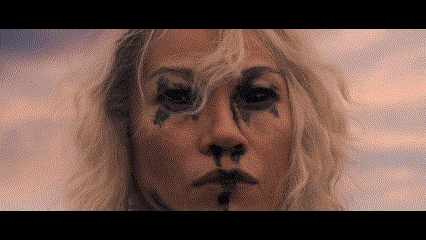
It’s interesting to see the character development that Aziraphale has gone through since his realisation that Heaven is perhaps not as “Good” as it portrays itself to be when we see him taking control of Shadwell’s gun to kill the Antichrist with, something which he has adamantly declared that he would be unable to do previously.
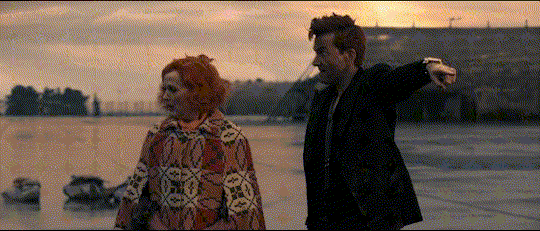
Crowley’s stance on the other hand appears not to have changed at all – he’s more than happy to support the decision to end the life of an 11-year-old boy in order to save the world, just so long as he’s not the one pulling the trigger. In fact, he not only supports that course of action, he vehemently chastises any doubts in it being the only one available to them. Madame Tracy’s interference with this particular plan of action feels to me like another statement of a recurring theme throughout the show – that the presence of free will is an inherently human quality. On this occasion, we see two non-earthly entities that both believe that there is only one course of action to be taken (i.e. there is no free will) whose actions are disrupted by a human entity who believes that this cannot be the case. What’s interesting to me is that the theoretically weaker of those entities, the human, wins out this little battle, suggesting that the actions taken as a result of free will always be victorious when pitted against actions taken through a lack of choice.
I absolutely adore watching Crowley’s expression when Aziraphale and Madame Tracy are separated. He can barely take his eyes of the angel, except when Madame Tracy announces that the separation made her feel “all tingly”.
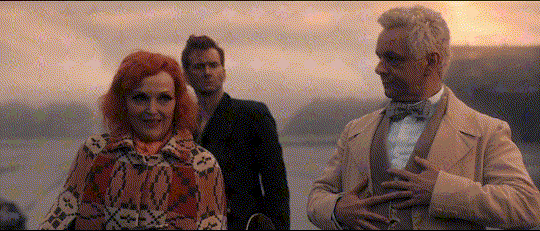
That side glance looks almost jealous to me… And what's with the little head dip with the flirty yet smitten (smited? smote?) shoulder squaring…
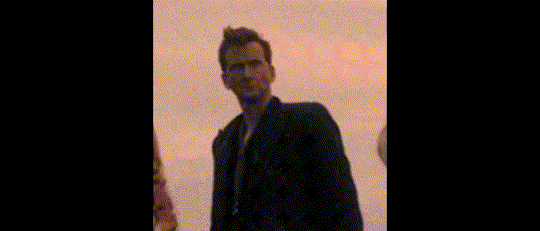
Oh, that’s right, it’s love. And probably not just a little bit of gratitude and relief that Aziraphale has been returned to him, at least for the moment. There’s even a slow blink at the very end of that clip that looks a bit like he might be trying to keep the tears away. This tiny sequence of body language cues has my heart melting every time I watch this scene, and bearing in mind that David is actually acting in the background of the shot here it speaks volumes to just what an incredible job he’s doing that I don’t watch anything in the foreground – my eyes are firmly fixed on him and his reactions. I’m pretty sad we don’t get to see the moment when Aziraphale goes to join Crowley (this assumption is based on the positioning we see in this shot and the one immediately after Newt tells Anathema he isn’t really a computer engineer) – there is a part of me that screams to see the eye contact and facial expressions involved in that whirlwind of inevitable emotions.
For a show that’s filled with dark comedy, there’s a slightly jarring sense of social delicacy in the dissolution of the Horsemen in that we don’t see any of The Them actually land a “fatal” blow. We see them take up the sword, see them holding that same sword after they impale their respective Horseman, we even see the suggestion of an impact, but we don’t see the brutal imagery of an 11-year-old child thrusting a weapon through the middle of an adult-shaped monster. The speech at the end of this episode is heavy on the subtext of the disappearance of innocence from children as they grow older, and I suspect the desire to maintain the feeling of childlike innocence in each of The Them is the reason we don’t see them committing a very violent act. We’re not only allowed to maintain that image, but it’s strengthened by Adam’s empowerment of each of them to do what needs to be done, and his assertion that the things they’re doing battle against aren’t actually people, but concepts. It makes the whole thing feel like children playing games in the woods, which I think is probably the whole point, and the reason we saw them doing so much of it earlier in the series (and especially in the book – honestly I actually got a bit bored of how much “children playing in the woods” content there was in the original text).
As a side note, and knowing that it has been pondered over by many others before me: how did Aziraphale’s flaming sword become War’s flaming sword?! I remembered to look in the FAQ list for this one, and couldn’t see that it has ever been answered.
Next side note: Dagon says that all of the legions of Hell that are readying for battle were angels before. Does that mean that every demon is a fallen angel? Because that’s a lot of fallen angels (Beelzebub says that there are 10 million of them later on in the episode).
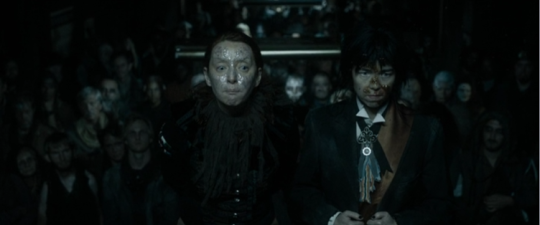
That’s also a pretty big revolution to have taken place “before the Beginning”. Surely if you were in charge of a place where half of your employees took place in an uprising, you’d have to question the validity of your leadership skills? There’s a little kudos going out to the sound editors here too – that effect of Beelzebub’s voice to make it sound like she’s buzzing like the flies she’s lord of is brilliant, mostly because it’s not there all the time, but fades in and out for maximum effect.
I also love the idea that a nuclear holocaust could all be avoided by running the disk defragmenter. It’s actually kind of appropriate, the job of the defragmenter being to rearrange important elements so that they fit together better, eliminating bad clusters as it goes, and all to ensure the hosting system can perform more smoothly. Feels like quite an appropriate analogy of a world gone mad with war.
Bearing in mind that I have been rattling on about parallels between the members of The Them and the Horsemen, there’s something interesting about Death’s parting comment to the group on the tarmac.
I AM CREATION’S SHADOW. YOU CANNOT DESTROY ME. THAT WOULD DESTROY THE WORLD.
If we’re considering that the previously mentioned pairings are mirror images of one another, would this suggest that Adam also cannot be destroyed? Or would it mean that his destruction would result in the creation of something else? Or if we took the words literally, would that make him the product of shadow (“shadow’s creation” instead of “creation’s shadow”). I like this latter idea, given who his father is (at this point anyway), but there’s something to be said for his potential for creation too, especially given his chosen name. I think there’s probably a lot to be said for possibilities for Adam’s character, which I’m planning on exploring in the future so I won’t go into this any further here.
Given the repeated suggestions we’ve seen that death = starlight (I’m paraphrasing for simplicity) in this show, and in other works by the original authors, it’s hardly surprising that Death disappears into a cluster of starts. God even tells us that, although they look like stars, they may be something else entirely, and that they reside within Death itself.
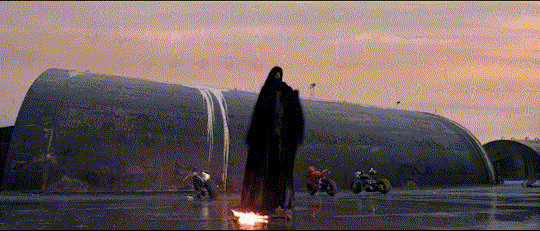
The complete dissolution of the Horsemen feels to me like a good place to stop. As always, questions, comments, discussion: always welcome. See you next time 😊
#good omens#episode analysis#good omens season 1#ineffable idiots#aziracrow#ineffable husbands#aziraphale#crowley#crowley loves aziraphale#crowley's plants#crowley's bentley#good omens soundtrack#good omens music#madame tracy#the them#good omens beelzebub
41 notes
·
View notes